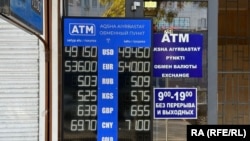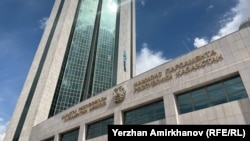Using the National Fund to boost the treasury: How lawmakers approved a budget with a deficit.
COMPLETED IN TWO MINUTES
To withdraw funds from the National Fund, which was established for future generations, the government must prepare a special bill and have it approved by parliament. The law was passed swiftly: the deputies agreed to withdraw 5.3 trillion tenge from the fund for the current budget year.
– The volume of guaranteed transfers from the National Fund for the years 2025-2027 is set at 2 trillion tenge annually, –
said in his brief report Deputy Prime Minister and Minister of National Economy Nurlan Baibazarov. – It is expected that the net foreign currency assets of the National Fund will amount to 62.2 billion US dollars in 2025, 69.9 billion dollars in 2026, and 78.7 billion dollars in 2027.
The minister stated that the funds from the National Fund will "ensure budget balance" and asked the deputies to support the project.
In the calculations, the government established a "cut-off price" for oil: 42.3 dollars per barrel in 2025 and 41 and 39.4 dollars in 2026 and 2027, respectively. This means that revenues from oil sales will go to the National Fund only if the price exceeds the "cut-off price."
At the same time, the three-year budget project indicated that the price of oil would be 75 dollars per barrel, with an average dollar exchange rate of 470 tenge. The government forecasts GDP growth of 5.6 percent in 2025, with inflation in the range of 5.5-7.5 percent.

Baibazarov managed to deliver his report and explanations in two minutes. The deputies listened to him in silence, with no dissenters. Only Deputy of the ruling party "Amanat," Tatyana Savelieva, expressed concern: if the government withdraws trillions from the National Fund annually, will it be possible to achieve the goal of accumulating 100 billion dollars in the fund by 2030?
– The draft republican budget indicates that, in addition to the guaranteed transfer, there is also a targeted transfer of 3.3 trillion tenge. Overall, the volume of transfers from the National Fund to the republican budget will amount to 5.3 trillion tenge. The government's annual promises to review the procedures for using National Fund resources and limit transfers remain empty words. Therefore, the question arises: will the government be able to achieve the goal of increasing the foreign currency assets of the National Fund to 100 billion dollars by 2030? – asked Deputy Savelieva.
Minister Baibazarov, reiterating the projected calculations in his report, noted that there are still five years ahead, but gave an uncertain answer, stating that much depends on oil prices. According to him, starting from 2026, the amount of funds withdrawn from the National Fund will decrease to 5 billion dollars. The minister stated that to reduce current "large" borrowings from the National Fund, it is "necessary to increase the revenue part of the budget." The government is working in this direction, he said.
The deputies, supporting the withdrawal project, stated that this money would "ensure budget balance," "support the economy," and "strengthen social stability" – ultimately, the law was passed.
Speaker of the chamber Erlan Koshanov announced that out of 93 deputies present, only one voted against, and two abstained.
WHY CAN'T THE STATE COVER ITS EXPENSES?
The consideration of the law on the three-year budget began with the question: "Why can't the state cover its expenses?" Parliament emphasized that despite the intensified fight against the shadow economy and changes in tax policy, revenues could not be increased. Government representatives, explaining the budget deficit, stated that alongside funds from the National Fund, it is planned to attract long-term loans for road construction. They associate the lack of revenues with the geopolitical situation and falling prices for oil and other goods exported by Kazakhstan.
– The republican budget still depends on world raw material prices. The government has a pessimistic plan, based on the forecast that the price of oil will be 60 dollars per barrel. Tell us, what will you do if the price of oil falls sharply? For example, if it drops below 60 dollars? Does the government have a Plan B that will save the country? – asked Majilis Deputy Bakhytzhan Bazarbek.
Deputy Rinat Zaitov expressed dissatisfaction that too little funding is allocated for social and infrastructure projects:
– By the order of the head of state, 400 comfortable schools were to be built. However, their number has decreased to 369, and there is still no funding for the construction of 157 of them. By April 2024, the minimum wage was supposed to be raised to 85 thousand tenge, but there has been no progress here either. By 2025, 95 percent of local roads were to be repaired, but this is also unlikely to be achieved, as you probably agree. I won’t mention all the unfulfilled promises made to the country and to us. The question is: what is the reason for the disagreements in the cabinet of ministers? And what are your further plans?

Deputies from "Amanat" noted that in the first nine months of this year, Kazakhstan's economy grew by 4 percent, while the share of small and medium-sized businesses in the economy is only 7 percent. The country's budget depends 40 percent on raw material exports. Deputy Edil Zhanbyrshin expresses understanding of the government's arguments but calls for savings.
– We need to create a new economy. Ineffective expenditures should be reviewed and optimized. For example, the estimated cost of many projects seems to be inflated. Perhaps the scale of some projects should be reduced, – he said.
– The government's work is aimed at fulfilling the orders of the head of state. All our actions are related to this. When considering the budget, we received requests for 32 trillion tenge, but only 15 trillion were available. With these funds, we will organize all the work, – noted Prime Minister Olzhas Bektenov.
"EXISTING AT THE EXPENSE OF THE PEOPLE SOME SCAMMERS"
Deputy Erlan Sairov raised the issue of returning funds from the National Fund that were spent to support commercial banks.
– The government plans to borrow 4 trillion tenge to cover the budget deficit. However, hundreds of billions of tenge of the people's money are already stored in commercial banks. Only in the "People's Bank" are there 500 billion tenge from the National Fund. In other private banks, there are 600 billion. This is the only case in the world where private banks exist at the expense of state funds. Why doesn't the government return these funds? In conditions where the budget is weakened, and the people are in a difficult position, why should "some scammers" fill their pockets at the expense of the population? – declared Sairov.
According to Prime Minister Bektenov, the banks that were once supported by the government are "now repaying their debts."
– There is an approved repayment schedule, and the banks that received assistance then are returning the funds according to the agreements and on time. Therefore, in my opinion, it would be wrong to make such an unexpected decision that could affect stability. Especially if the banks that form the system encounter financial difficulties – this will affect the economy of the whole country. The government monitors and controls this process, and all state assistance will be returned, – said the Prime Minister.
"AMANAT SUPPORTED, AK ZHOL OPPOSED"
Despite the criticism and skepticism regarding the government’s work, the deputies ultimately approved the draft budget for 2025-2027. Out of six factions in the Majilis, only "Ak Zhol" opposed it, while the Nationwide Social Democratic Party abstained.
Minister of National Economy Nurlan Baibazarov requested a three-year period to stabilize state revenues, noting that a corresponding plan has already been approved.
– To stabilize the revenue part of the budget, we need about three years. During this period, we must adopt a new Tax Code, launch large industrial enterprises, revive production, and fulfill the task of developing the economy and business, – said the Minister of National Economy of Kazakhstan Nurlan Baibazarov.
In the three-year budget, according to the government report, three priority areas have been allocated: social support for citizens, support for the education system, and provision of medical assistance to the population. A significant portion of the funds is also directed toward ensuring the population has access to clean water, heating, and electricity.
"A SIGN OF GOVERNMENT INCOMPETENCE"
According to economist Meruert